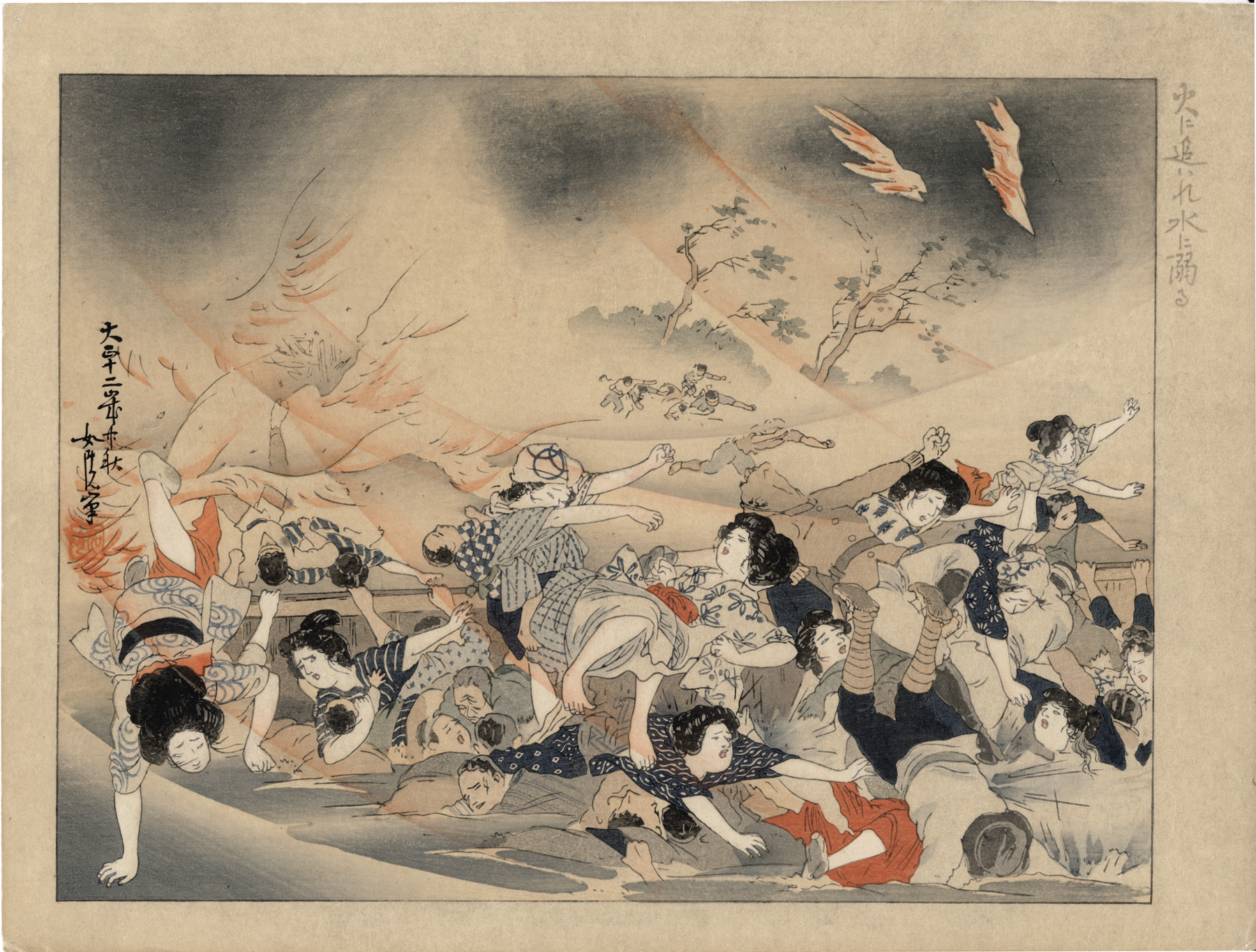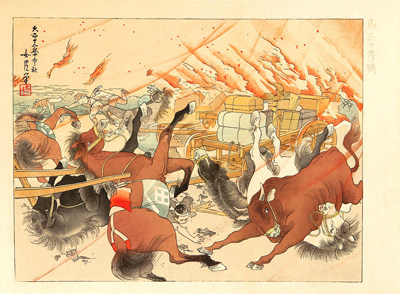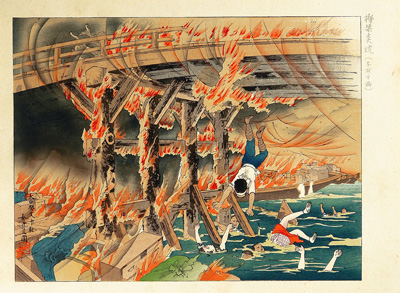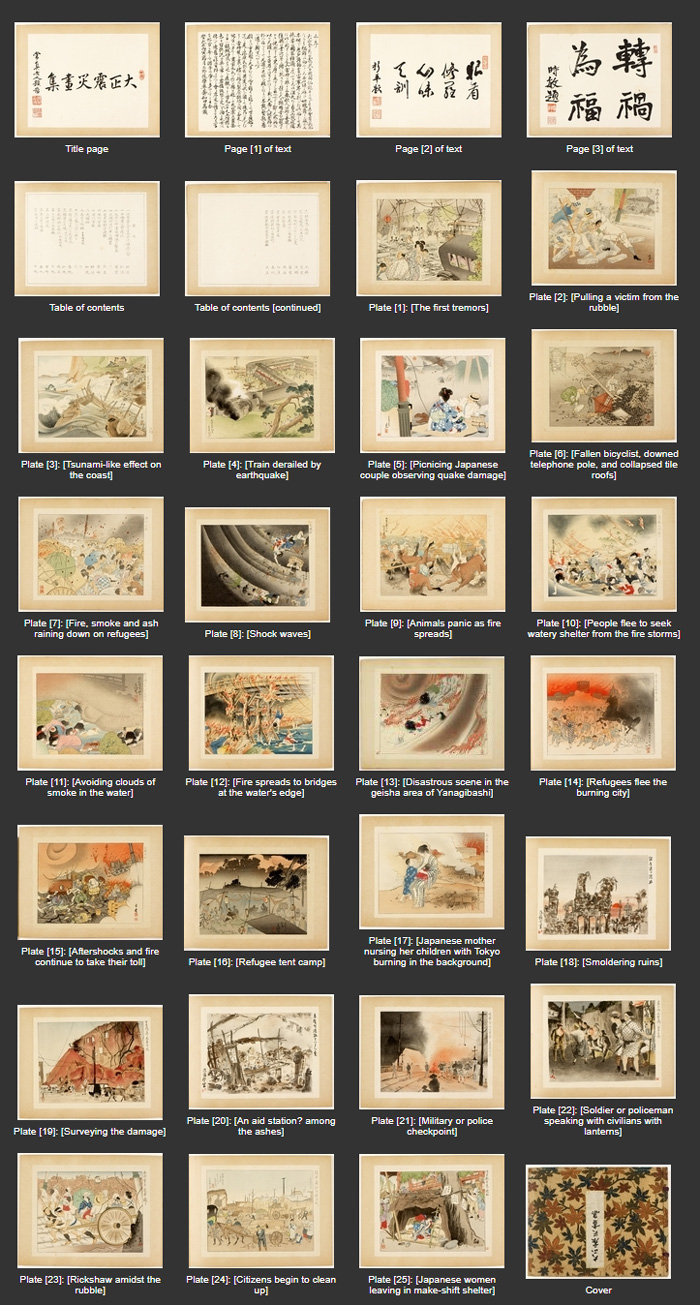About This Print
One of three prints (see images below) contributed by the artist Hamada Josen (1875-?) Josen to the series Pictures of the Taishō Earthquake, issued in 1926 three years after the 1923 Great Kantō Earthquake. This print pictures the horror of people fleeing the firestorms that came on the heels of the earthquake, only to drowned in the hoped-for safety of the water.| Hamada Josen 馬匹の慘禍 吾妻橋附近 Tragedy of Horses (Bahitsu no Sanka) | Hamada Josen 橋梁の炎燒 本所方面 Fire on the Bridges around Honjo District (Kyouryou no Ensho; Honjo Homen) |
About the Series "Pictures of the Taishō Earthquake"
This series consists of 25 prints by nine, mostly lesser-known, artists, a number of whom, including this print's creator, were students of the Nihonga artist Tomioka Eisen (1864-1905). The nine artists are Shunhan Katayama (fl. c. 1901–1926); Yawata (Yahata?) Hakuhan (1893–1957); Noguchi Kōgai (active c. 1920s); Igawa Sengai (1876-1961); Kiritani (Kirigaya) Senrin (1876-1932); Shibata Kōyō (fl c. 1920s); Hamada Josen (1875-?); Kondō Shiun (fl. c. 1923– 1930s) and Unpo Takashima (fl. c. 1920s).
When this series was issued in 1926, Tokyo and its environs were already well-along in their rebuilding, which "started before the last embers were out"1 and was to be officially completed in 1930. This series, along with an earlier 1924 series of 36 prints, Collection of Woodblock Prints of the Taishō Earthquake, served to, in the words of the pre-publication announcement for the 1924 series, convey "to future generations, in an artistic manner, the true import of these events."2
All of the prints in this series and the bound book in which they were issued (see below), can be viewed on the website of Wolfsonian Florida International University's Digital Image Catalog where they formed part of their September 2011 commemorative exhibition of the tragedy of September 11, 2001, titled “Reflections on Loss and Commemoration.”
Digital Image Catalog and see details of each thumbnail.
2 The Artist's Touch, The Craftsman's Hand: Three Centuries of Japanese Prints from the Portland Art Museum, Maribeth Graybill, Portland Art Museum, Oregon, 2011, p. 273.
The Great Kantō Earthquake
Source: The Artist's Touch, The Craftsman's Hand: Three Centuries of Japanese Prints from the Portland Art Museum, Maribeth Graybill, Portland Art Museum, Oregon, 2011, p. 273.
"The Great Kantō Earthquke of 1923 stands in memory as one of the most terrifying calamities in Japanese history. Registering at a magnitude of 7.9, the quake struck on September 1, with its epicenter some 50 miles southwest of Tokyo, in Sagami Bay. The hour was 11:58A.M., just when households everywhere were lighting small charcoal stoves to prepare lunch. Fires broke out instantly in the densely populated cities of Tokyo and Yokohama and were spread by high winds. Since the earthquake had broken the water lines, both cities were reduced to smoldering ruins within a few hours.... The earthquake and its aftermath caused well over 140,000 deaths and left nearly 700,000 people homeless."
Print Details
| IHL Catalog | #662 |
| Title or Description | Chased by the Fire, Drowned in the Water [as written in Japanese (see below) in upper right margin] 火に追われ水に溺る (Hi ni oware mizu ni oboru) Great Sacrifice 大犠牲 [as written Japanese in table of contents for series] |
| Series | Pictures of Taisho Earthquake (Taishō shinsai gashū 大正震災画集) (also seen translated as Taishō Earthquake Disaster Print Collection) |
| Artist | Hamada Josen (1895-?) |
| Signature | Josen ga |
| Seal | artist's rectangular seal |
| Publication Date | 1926 |
| Publisher | Emaki Kenkyūkai 絵巻研究会 [エマキ ケンキュウカイ] |
| Carver | |
| Printer | |
| Impression | good |
| Colors | good |
| Condition | fair - toning |
| Genre | |
| Miscellaneous | |
| Format | |
| H x W Paper | 8 1/2 x 11 1/8 in. (21.6 x 28.3 cm) |
| H x W Image | 7 3/8 x 9 3/4 in. (18.7 x 24.8 cm) |
| Collections This Print | The Wolfsonian FIU Library Collection (JAPA) 83.2.2324 |
| Reference Literature |





